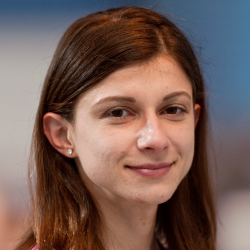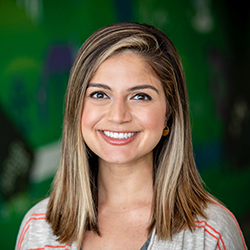Motility Program
What is the Motility Program?
Gastrointestinal motility refers to the movement of food through the digestive tract, from the mouth to the anus. In a healthy person, the nerves and muscles of the digestive tract work together to move food through the body so it can absorb nutrients and get rid of waste (poop).
But when problems with tissues, nerves or muscles keep the digestive system from working properly (motility disorders), serious and perhaps life-threatening symptoms develop.
Our Motility Program provides accurate diagnosis and comprehensive treatment for children and adolescents with motility disorders.
Why choose Seattle Children's?
We offer the only pediatric motility program in the Pacific Northwest. Our doctors are experts in finding and treating the most complex gastrointestinal and motility issues. We work with you and your child to help your child have as normal a life as possible.
Getting a correct diagnosis is the first step toward improving your child's condition. So it's important to see a gastroenterologist who specializes in motility disorders in children and teens, and who is able to do the correct tests and provide the best treatment options
Seattle Children's is the only hospital in the region offering the complete range of manometry studies (motility studies). Manometry is a special test using a computer to trace the motion of the gut. These tests allow our doctors to check how the muscles and the nerves of your child's digestive system work and find any abnormalities that may be leading to their symptoms. This information may mean that there are other treatment options besides surgery, or may delay surgery for now.
Our Motility Program provides coordinated care to ensure that your child gets all areas of their care needs met. We bring all the necessary specialists together: pediatric gastroenterologists, surgeons, rehabilitation physicians and dietitians. We will work with you to coordinate your appointments.
Because we focus solely on children and adolescents, we know that they have different needs than adults. We will partner with you to make sure your child or teen feels safe, understands what is happening and is able to be part of decisions around their care as appropriate to their age or developmental level. Child life specialists can work directly with you and your child to help relieve tension, express concerns or fears and feel more in control about the hospital experience.
Conditions We Treat
We treat children and adolescents with a variety of motility disorders, including those related to:
- Achalasia (problems with muscles in the lower part of the esophagus)
- Anorectal malformations (imperforate or buried anus or cloaca)
- Organic and unmanageable constipation or fecal incontinence (soiling)
- Dysphagia (swallowing problems) with concern for esophageal dysmotility (abnormal contractions)
- Gastroparesis (problems with the stomach emptying into the small intestine)
- Pseudo-obstruction (intestinal dysmotility with symptoms like those caused by bowel obstruction, or blockage without actual anatomical blockage)
- Hirschsprung disease with continued bowel problems
- Internal anal sphincter achalasia (failure of anal sphincter to open and close)
- Colonic dysmotility (severe constipation caused by nerves or muscles that don't work properly)
- Spina bifida/myelodysplasia with associated colonic dysmotility and bowel difficulties
- Spinal cord injuries or abnormalities with associated colonic dysmotility and bowel difficulties
- Tethered spinal cord with lack of colon motility and bowel difficulties
Services We Provide
We provide the most effective diagnostic and therapeutic options, including long-term follow-up care and:
Manometry studies (motility studies)
Manometry studies use a special computer that allows the doctor to measure the pressure or contractions anywhere along the digestive tract, from the mouth to the anus. Depending on what kind of study is being done, your child may need to stay in the hospital for two or three days. Your child may be sedated to ensure that the test is as safe and comfortable as possible. Seattle Children's is the only program in the Northwest to offer a complete range of manometry studies for children, such as:
- Esophageal manometry: evaluates the motility of the esophagus (food tube)
- Antroduodenal manometry: measures the contractions (muscle action) within the stomach and the small intestine
- Colonic manometry: measures contractions within the colon (large intestine)
- Anorectal manometry: tracks the function of the rectum and anus
Pyloric Botox injection
This treatment involves injecting botulinum toxin (Botox) into the pyloric sphincter, which is the muscle inside the body at the end of the stomach through which food passes to the small intestine. This procedure is done during gastrointestinal endoscopy (see below) for some children or teens with gastroparesis.
Internal anal sphincter Botox injection
This treatment involves injecting botulinum toxin (Botox) into the internal anal sphincter, which is the muscle inside the anal canal that controls the holding and release of poop. This procedure is performed for children or teens with Hirschsprung disease who have continued bowel problems.
Pneumatic balloon dilation for achalasia
Once achalasia is diagnosed, we offer a less invasive treatment option (as opposed to surgery), such as dilation of the lower esophagus. This procedure is performed during gastrointestinal endoscopy (see below). It is considered in children or teens with achalasia or for those who continue to have symptoms despite corrective surgery.
Gastrointestinal endoscopic testing
Gastrointestinal endoscopy allows your child's doctor to look inside your child's body, from the mouth to the large bowel (gastrointestinal tract). During endoscopy, the doctor uses a small, flexible tube with a light and camera on the end (endoscope). Usually, the tube is inserted in your child's mouth to see the upper part of the gastrointestinal system or through their bottom (rectum) to see the lower part. Our providers have a great deal of experience in performing endoscopies on children, and take care to ensure the procedure is as safe and comfortable as possible.
Second opinions
Our doctors can meet with patients and families already in treatment who would like a second opinion and consultation.
pH monitoring and impedance
Doctors often perform pH monitoring/impedance testing along with gastrointestinal endoscopy. During this test, the doctor puts a small wire into the lower part of the tube that carries food to the stomach (esophagus). The wire carries a device that measures the amount of reflux (acid or nonacid) going into the area.
Who’s on the team?
Team
Dr. Lusine Ambartsumyan is a board-certified pediatric gastroenterologist. She has special training and expertise in the mechanics of fecal holding and elimination abnormalities in children with anorectal malformations, spinal cord abnormalities, intractable constipation and post-surgical Hirschsprung disease. She provides diagnosis and management of gastroparesis, pseudo-obstruction, achalasia and aerodigestive disorders (respiratory problems caused by underlying gastrointestinal issues).
The team also partners closely with other specialists from Gastroenterology and Hepatology, Reconstructive Pelvic Medicine, Pediatric General and Thoracic Surgery, Pulmonary, Neurodevelopmental and Rehabilitation Medicine.
How do I schedule an appointment?
Motility clinic appointments are available in Federal Way and at the hospital campus in Seattle. All procedures and tests are done in Seattle.
If you would like a referral to the Motility Program, talk with your gastroenterology provider or primary care provider.
Once we receive the referral we will contact your provider to request your child’s records for review. One of our team members may call you to gather more information and to schedule your appointment. If you have questions about your appointment call 206-987-2521, option 1.
Your child will be scheduled with a motility specialist, who works as a team with a nurse practitioner and a registered nurse. Together they work with your GI provider or primary care provider to provide the best care for your child and you. Your GI provider or primary care provider will continue your child’s care after being seen by Seattle Children’s Motility Program team.

